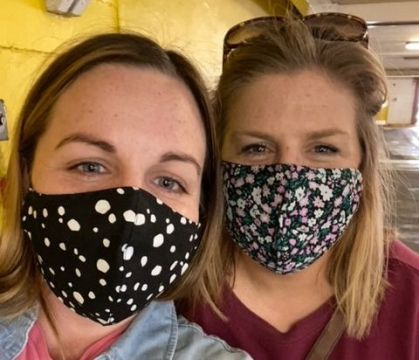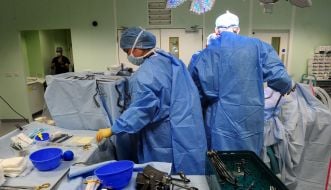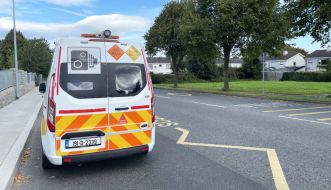Seven months on from positive tests for Covid-19 at Christmastime, two young sisters from north Dublin are still unable to return to work due to the disease’s lingering after-effects.
It is estimated that 10 per cent or more of those diagnosed with the virus will go on to experience long Covid, with ongoing symptoms for weeks or months after an initial infection.
With Ireland currently reporting more than 1,000 new cases daily, this estimate means that the number with the condition here could be growing by upwards of 100 each day.
31-year-old Alison and 36-year-old Karen Griffin are among the more than 2,000 members of Facebook group Long Covid Cases Ireland, where some experiencing long-haul symptoms turn to find support.
[I had a] really busy hectic lifestyle and that has completely flipped
Alison, a mother of three who was working as an intensive care nurse prior to her positive test, said her life has “completely flipped” since contracting the virus through community transmission.
“I was in the gym, I was working full-time shift work with three young kids, a partner, really busy hectic lifestyle and that has completely flipped, and I'm on the other end of the spectrum now,” she said.
“Long Covid is like an invisible illness... People might see me out and my hair might be done and I might wear nice clothes, but before I get to go out and look well, I have to rest the day before.”
'I never went into hospital'
After receiving her positive test result on December 28th, Alison experienced “moderate” symptoms for close to the first two weeks of her infection, including a fever, loss of taste and smell, headaches, cough and shortness of breath.
“I never went into hospital,” she said. “It was the after-effects of Covid that brought me into the Mater at that time in January.”
It was 13 days into her infection, on January 10th, that Alison began to experience effects that would linger for months to come.
She was brought to the Mater Hospital by ambulance with a suspected stroke after she woke up with intermittent loss of vision in one eye, vertigo and lack of muscle control or ataxia.
It was in the hospital’s A&E that a consultant in infectious diseases told Alison that what she was experiencing was “a neurological side effect of Covid because my immune system was stripped to nothing.”
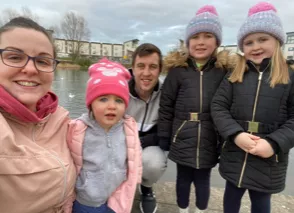
Months later, the effects of Covid are still lingering in numerous forms, from hair loss to tinnitus keeping the 31-year-old awake into the night.
“I still have headaches, fatigue, brain fog, like, serious memory issues which is quite worrying being an ICU nurse because you have to think on the spot,” she said.
“I have three young kids, I have a two-year-old, a six-year-old and a seven-year-old, so I literally have no energy for them.
“Anxiety has had a really strong negative effect on my mental health... when that episode happened on the 10th of January, obviously I got such a fright,” she added. “So, I got like anxious and I started having panic attacks.
“What I think really needs to be highlighted as well is that although Covid and long Covid is kind of a physical illness, it can have a serious impact on your mental health.”
'I completely changed as a person'
Alison’s sister, 36-year-old Karen Griffin, also described the impact of the disease on her mental and physical health as “life changing”.
“I completely changed as a person, I’m not half the person I was before I got Covid, definitely I'm not the bubbly person that I was back then either,” she said. “It’s life changing. And people don’t know enough about it.”
For Karen, who works on the frontline in the public service, symptoms that began on December 29th were confirmed as Covid by a positive test result on New Year's Eve.
“I got actually all the typical Covid symptoms except the temperature,” she said. “So I kind of I managed okay at home. I was fairly sick, I live on my own. So, it was quite tough, I had people dropping stuff to the door.”
On the morning of January 8th, Karen woke up and “just knew something had changed”.
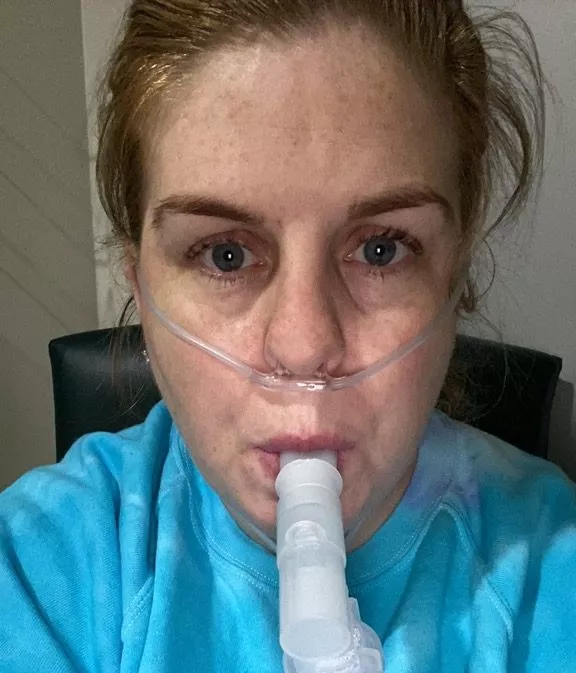
She rang an ambulance, and paramedics arrived and administered her oxygen inside her house. Although they felt her oxygen had improved to a level where she did not need to be admitted to hospital, her GP insisted.
“To be honest with you, I feel that man saved me,” Karen said, with tests in the hospital revealing she had developed double moderate pneumonia.
“A doctor came into me and basically said... we don't know how you managed to stay at home as long as you did because you have double pneumonia,” she said.
'Covid was nearly easier than long Covid'
After a week on oxygen in the Covid ward of the hospital, Karen was released and told she should start improving after a couple of weeks.
“I was told that by the time I was six months post-Covid, I would be brand new, you know, like I'm coming up to seven months now, and I'm nowhere near brand new,” she said.
Her continuing side effects include severe headaches, a chronic pain condition affecting the trigeminal nerve in the face, joint pain, cold sores or mouth ulcers, fatigue and brain fog where Karen sometimes struggles to even remember conversations.
“The breathlessness was quite bad. And my heart rate was ridiculous. Like I might walk 200, not even 50 metres, and my heart rate could be up to 150,” she said.
“It’s an invisible disease... and to be honest, I actually think that the period of having Covid, as awful as that was, it was nearly easier than having the long Covid.
“Because you knew the actual Covid virus would last a couple of weeks. Now it was horrific, don't get me wrong. But when you have long Covid, you don't know if or when it’s going to get better. Like medical experts can't tell us.”
'Learning as we go'
The 36-year-old said the after-effects of the virus are “hard to understand or believe unless you’ve seen it first-hand”.
“I was in good health, I was training three times a week in the gym with a personal trainer. I'm not the kind of person to sit around anyway, I always have something to be doing. And this has knocked me, like I can walk one kilometre now,” she said.
Taking 18 weeks off work after her initial illness and hospitalisation, she “lasted six weeks” after returning.
“I had a bad relapse and I’m off work now again. So, I don't know if I pushed myself too much,” Karen said. “I thought I was ready to go back.”
Also unable to return to work, Alison is still discovering new impacts of the virus, recently diagnosed with tachycardia syndrome, an abnormal increase in heart rate that occurs after sitting up or standing, at the post-Covid clinic she attends.
“It just shows six months later, I'm still getting told I have new things, and it's very real. It's a very real illness,” she said.
“I know there's kind of more recognition now that it is a proper illness. But it'd be, you know, doctors trying to fob you off and it would be nice if people were honest and say, you know, it's a new illness, and we don't know much, we're learning as we go.”

The sisters said that having each other, along with the support of their GPs and the Facebook group, has made the journey easier.
“Myself and Karen were a great support system and I wouldn’t have gotten through without her. We FaceTimed three or four times a day to check in on each other,” Alison said.
“It's very hard to explain and talk to someone about long Covid when they haven't experienced it... people might think, ‘Oh this one, she's exaggerating’,” she said of the Facebook group.
“But when you go on to that group, everyone has quite similar side effects, and you just feel ‘Oh my god, I'm not crazy, I'm not losing my mind. This is a real thing.’”
“It’s a really slow recovery process... my goal is to get back to hopefully where I was, be able to run around the park after my three kids... and obviously get back to the job that I love,” Alison said.
Karen, who is still waiting on a follow-up appointment from a post-Covid clinic, said some can find it hard to believe that someone her age has been as affected by the virus.
“I have mentioned my story on my Instagram page and people have contacted me saying, 'God, I can't believe like somebody so young as you or somebody as healthy as you has got it,'” she said.
“It just goes to show that people just assume that it’s older people or people in ill health and it’s really, really not.”
Numbers affected
In response to a query from Breakingnews.ie, the Health Service Executive (HSE) said it was currently examining how it can model the possible numbers that will be affected by long Covid in Ireland.

“There is a lot of uncertainty in the international literature about how many people experience prolonged symptoms so it is extremely difficult to determine the scale as yet in Ireland,” a statement said.
“However, we are monitoring the situation very closely and looking at how we can best estimate the scale, this will take some time and will need continual review.”
The HSE said treatment is currently focused on the management of specific symptoms through GPs or hospital-based specialists, and a national approach to long Covid is currently “under active consideration”.
“The aim is to provide a pathway that would be largely community-based, supporting general practice and supporting people to manage any symptoms and then setting up a limited number of specialist pathways for those people who require specialist services,” the HSE said.
